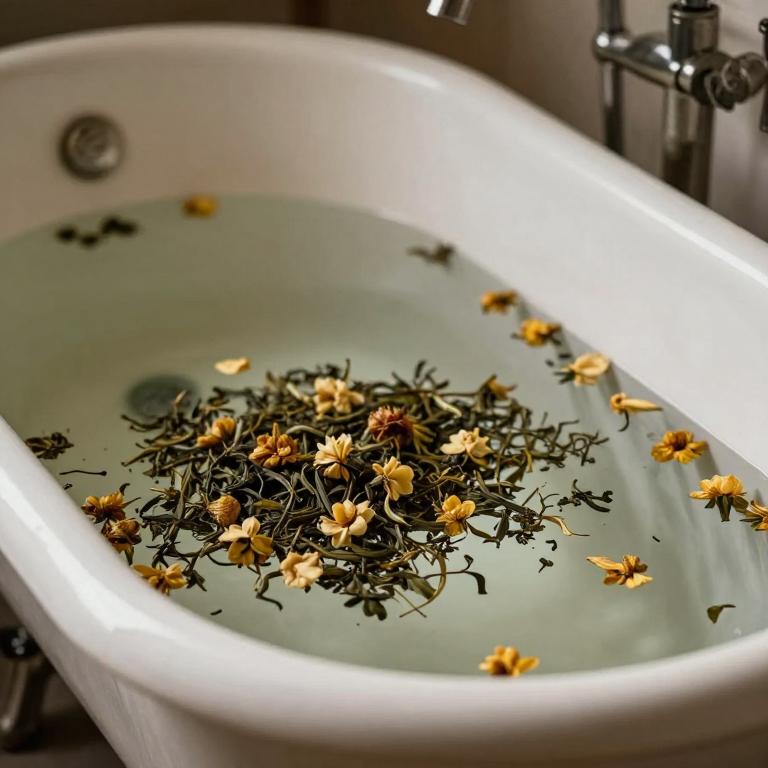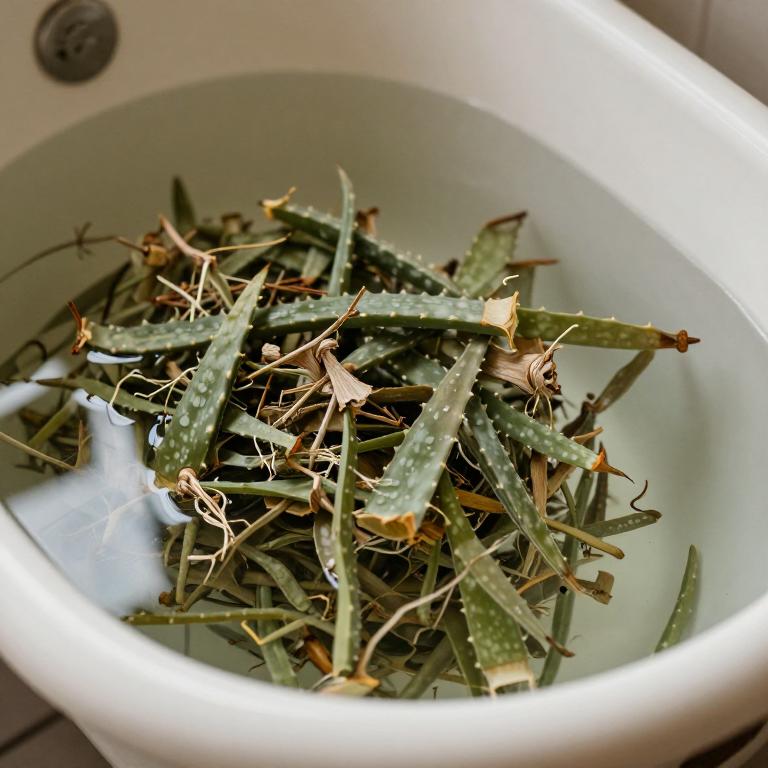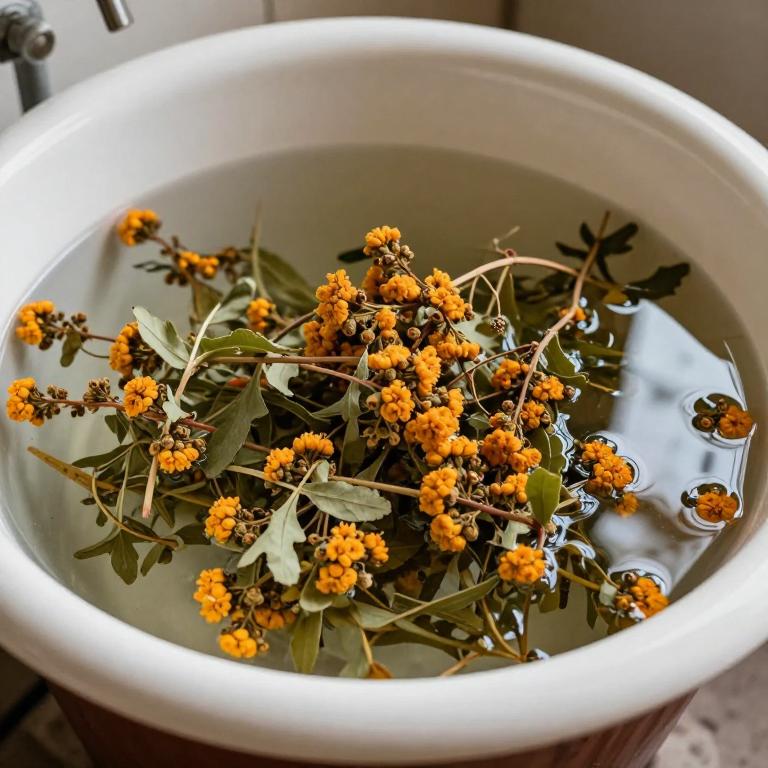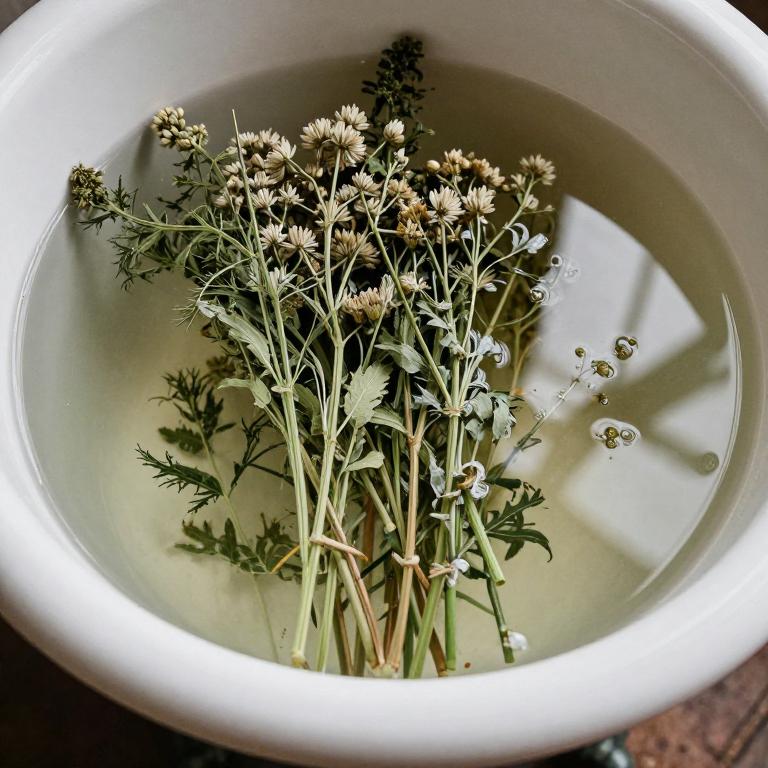10 Best Herbal Baths For Glowing Skin

Herbal baths for glowing skin involve soaking in warm water infused with natural herbs known for their skin-renewing properties.
Common ingredients like lavender, chamomile, and calendula help soothe inflammation and promote a radiant complexion. These baths can improve blood circulation, detoxify the skin, and reduce stress, all of which contribute to a healthier glow. Regular use of herbal baths can enhance skin texture and hydration, leaving the skin soft and luminous.
Incorporating these natural remedies into a skincare routine offers a safe and effective way to achieve a natural, healthy glow.
Table of Contents
- 1. Camellia (Camellia sinensis)
- 2. Aloe vera (Aloe barbadensis)
- 3. Chaste tree (Vitex agnus-castus)
- 4. Stinging nettle (Urtica dioica)
- 5. Field horsetail (Equisetum arvense)
- 6. Salvia (Salvia officinalis)
- 7. Thistle (Silybum marianum)
- 8. Rosemary (Rosmarinus officinalis)
- 9. St. john's wort (Hypericum perforatum)
- 10. English lavender (Lavandula angustifolia)
1. Camellia (Camellia sinensis)

Camellia sinensis, the plant from which green tea is derived, is increasingly being used in herbal baths to promote glowing skin due to its rich content of antioxidants and anti-inflammatory compounds.
When infused into bath water, camellia sinensis helps to soothe the skin, reduce redness, and enhance its natural radiance by detoxifying and nourishing the skin’s surface. The antioxidants present in green tea, such as catechins, work to neutralize free radicals, which can contribute to skin aging and dullness. Regular use of camellia sinensis herbal baths can lead to a more even skin tone and improved skin texture, leaving the skin feeling refreshed and looking healthier.
This natural remedy is a gentle yet effective way to incorporate the benefits of green tea into a skincare routine for a luminous complexion.
2. Aloe vera (Aloe barbadensis)

Aloe barbadensis, commonly known as aloe vera, is a versatile herbal remedy that has been used for centuries to promote skin health and radiance.
When incorporated into herbal baths, aloe vera helps to soothe and moisturize the skin, reducing redness and irritation while enhancing its natural glow. The gel from the aloe plant contains essential nutrients like vitamins A, C, and E, as well as minerals and enzymes that nourish and repair the skin's surface. Regular use of aloe-based baths can improve skin elasticity, reduce the appearance of blemishes, and leave the skin feeling soft and refreshed.
This natural remedy is ideal for those seeking a gentle yet effective way to achieve a healthy, luminous complexion.
3. Chaste tree (Vitex agnus-castus)

Vitex agnus-castus, commonly known as chaste tree berry, has been traditionally used in herbal baths to promote glowing skin due to its balancing effects on hormonal levels.
When infused into bath water, the essential oils and phytochemicals from vitex can help reduce inflammation, soothe skin irritations, and enhance circulation, leading to a more radiant complexion. Regular use of vitex herbal baths may support skin renewal by encouraging the production of collagen and improving skin elasticity. This natural remedy is especially beneficial for those experiencing hormonal fluctuations, such as during menstruation or menopause, which can affect skin health.
Incorporating vitex into a weekly bath routine can be a gentle yet effective way to achieve a healthier, more luminous glow.
4. Stinging nettle (Urtica dioica)

Urtica dioica, commonly known as stinging nettle, is a powerful herb that has been traditionally used for its skin-enhancing properties.
When used in herbal baths, it helps to detoxify the skin, reduce inflammation, and promote a healthy glow by improving circulation and balancing skin pH. The leaves of stinging nettle contain rich nutrients like silica, vitamins A and C, and minerals such as iron and magnesium, which contribute to skin renewal and radiance. To prepare a nettle bath, fresh or dried leaves can be steeped in hot water and then added to warm bathwater, allowing the skin to absorb the beneficial compounds.
Regular use of urtica dioica herbal baths can lead to clearer, more luminous skin while also offering a calming and soothing experience.
5. Field horsetail (Equisetum arvense)

Equisetum arvense, commonly known as field horsetail, is a rich source of silica and has been traditionally used in herbal baths to promote glowing skin.
The high silica content helps strengthen skin structure and improve elasticity, leading to a more radiant appearance. When used in a bath, the water infused with horsetail extract can soothe the skin, reduce inflammation, and enhance moisture retention. Its astringent properties also help tighten pores and minimize the appearance of blemishes.
Regular use of equisetum arvense herbal baths can contribute to a clearer, smoother, and more luminous complexion.
6. Salvia (Salvia officinalis)

Salvia officinalis, commonly known as sage, has been traditionally used in herbal baths to promote glowing skin due to its high concentration of antioxidants and anti-inflammatory properties.
When infused into bath water, sage helps to soothe irritated skin, reduce redness, and enhance skin radiance by promoting cell renewal. Its essential oils and phytochemicals work to detoxify the skin and improve circulation, leading to a healthier complexion. Regular use of sage herbal baths can also help balance oil production and reduce the appearance of blemishes.
For best results, combine sage with other calming herbs like lavender or chamomile to create a relaxing and rejuvenating skin care ritual.
7. Thistle (Silybum marianum)

Silybum marianum, also known as milk thistle, is a powerful herb often used in herbal baths to promote glowing skin.
Its active compound, silymarin, is known for its antioxidant and anti-inflammatory properties, which can help detoxify the skin and improve its overall appearance. When infused into bath water, silybum marianum can help reduce skin irritation, redness, and blemishes, leaving the skin feeling refreshed and radiant. Regular use of this herbal bath can enhance skin elasticity and brightness, making it a natural alternative to commercial skincare products.
Incorporating silybum marianum into a skincare routine can support long-term skin health and contribute to a more luminous complexion.
8. Rosemary (Rosmarinus officinalis)

Rosemary officinalis, commonly known as rosemary, is a versatile herb widely used in herbal baths for promoting glowing skin.
When infused into bath water, rosemary essential oil or dried leaves can help improve circulation, which enhances skin radiance and texture. The anti-inflammatory and antioxidant properties of rosemary support skin health by reducing redness and protecting against environmental damage. Regular use of rosemary herbal baths can also help detoxify the skin and leave it feeling refreshed and revitalized.
This natural remedy is especially beneficial for those seeking a holistic approach to achieving a healthy, glowing complexion.
9. St. john's wort (Hypericum perforatum)

Hypericum perforatum, commonly known as St. John's Wort, has been traditionally used in herbal baths to promote glowing skin due to its anti-inflammatory and antioxidant properties.
When infused into warm water, the oil from the flowers can help soothe skin irritations and reduce redness, leaving the skin feeling soft and refreshed. The bath also helps in improving blood circulation, which can enhance the skin's natural radiance and promote a healthy complexion. Regular use of St. John's Wort baths may aid in treating minor skin conditions like eczema or acne, contributing to a more even skin tone.
However, it is important to consult a healthcare professional before using this herb, especially if you are on medication, due to its potential interactions.
10. English lavender (Lavandula angustifolia)

Lavandula angustifolia, commonly known as English lavender, is a popular herb used in herbal baths for its soothing and skin-nourishing properties.
When infused into bath water, lavender essential oil promotes relaxation and helps reduce stress, which can indirectly improve skin health by minimizing breakouts and inflammation. The anti-inflammatory and antimicrobial properties of lavender help soothe irritated skin and promote a clearer complexion. Regular use of lavender-infused baths can enhance skin hydration and texture, leading to a more radiant and glowing appearance.
Additionally, the calming aroma of lavender enhances the overall bathing experience, making it both therapeutic and beneficial for achieving a healthy, glowing skin glow.